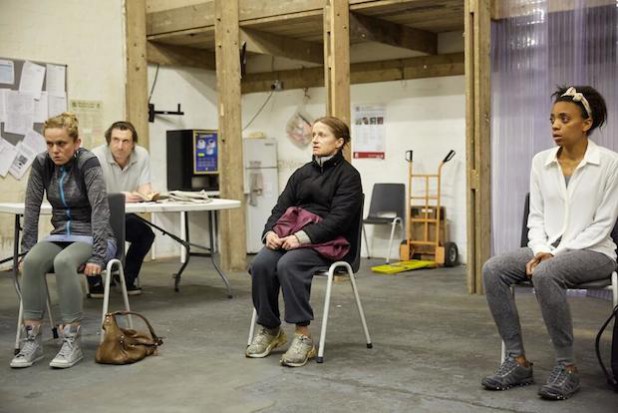Beyond Caring, The Yard
reviewed for The Spectator, 15 July 2014

Zero-hours contracts: refuse to work with one, and you might lose your benefits. To the Left, it’s preeminent proof of the Coalition’s malevolence, a brightly blazoned slave contract clutched in a cold Tory fist. So it’s no wonder that the lefty press has seized upon Beyond Caring, Alexander Zeldin’s new play about the invisible working poor, as one big ‘fuck this Government, basically’.
The Guardian starts its puff-preview with a reminder that ‘16 per cent don’t get the hours they need to make ends meet and one-in-four would like more work‘ (we hear little about the other 84 per cent). The original report from which the Guardian selectively quotes in fact concluded that ‘zero-hours contracts have been unfairly demonised and oversimplified‘. Given all the Government is currently doing to abolish real slavery, it’s all a bit egregious.
Which is a shame because Beyond Caring, which Zeldin devised and directed, is a far more subtle, contemplative work than its critical fans and its aggressively political marketing campaign suggest. There’s precious little griping about government policy or abstract economics; instead of agit prop, we get five gentle character sketches. It’s an elegy to an invisible class: four industrial cleaners (sorry, ‘members of the hygiene team’) in a miserable meat factory, three on zero-contracts with agencies, one despondently clinging to his full-time job, all dependent on the changing demands of jobsworth overseer Ian (Luke Clarke). If that sounds like a downer, what makes Beyond Caring eventually engage its audience (albeit late into the hour and a half running time) is the depth of suppressed emotion pressured into each performance.
This is character-driven theatre at its purest: Hayley Carmichael’s Susan, possibly homeless, probably hiding it, is a heart-shattering study in powerlessness. Susan, Grace and Becky are agency workers, which means they’re subject to constantly changing shifts, and unpredictable pay delays. When the latter strikes, it means a night without a hostel for Susan; for Becky (Victoria Moseley), damaged and brittle, it means bullying the softer Grace into a quick loan, even though Grace is in trouble with loan sharks herself. Though there’s the odd reference to ATOS (evil), benefit cuts (thoughtless) and poor worker protection (so much for poor Grace’s no-heavy-lifting clause), this isn’t really a play about the political causes of poverty. It’s a play about what unremitting poverty does to the soul, where poverty is not starvation, but life without dignity.
But it’s precisely this dedication to character sketches that makes it difficult to really care about Beyond Caring. Each of Zeldin’s characters, with the exception of Clarke’s charisma-free zone, feels dense with backstory, the result, one suspects of weeks or months of improvisation. We’re only granted glimpses of what is clearly lurking in the background – is Becky’s daughter in jail, one wonders, or why else is she kept so far away? Why does Phil, a gentle, compelling Sean O’Callaghan, lock himself away in the bathroom every so often quietly to weep? But at some point, one assumes, Zeldin is bound to tell us something.
Or not. The influence of Mike Leigh’s improvisational method is clear: these are rich characters, impeccably researched before being released on stage, but then given precious little to do. At times Beyond Caring is so naturalistic that it runs the risk of being as boring as everyday life. Certainly, it needs a plot, and in the absence of one, the evening can feel deceptively long indeed. But while it is underdeveloped, it’s also full of promise. And the Yard Theatre’s commitment to developing new work is the basis of its ascent to east London arts powerhouse (the food is good too). Beyond Caring feels like a work in progress, but it deserves a second life.






